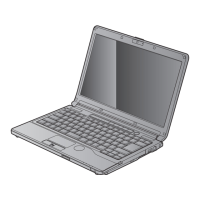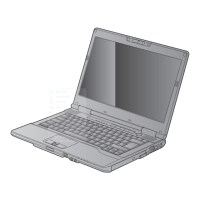73
- Memory Upgrade Module
Memory Upgrade Module
Your Fujitsu LIFEBOOK notebook comes with a minimum of 2GB of high speed Double Data Rate 3 Synchronous Dynamic
RAM (DDR3-1600 SDRAM) factory installed. To increase your notebook’s memory capacity, you may install an additional
memory upgrade module. The memory upgrade must be a dual-in-line (DIMM) SDRAM module. To ensure 100%
compatibility, purchase the SDRAM module only from the Fujitsu web store at www.shopfujitsu.com.
Installing Memory Upgrade Modules
1 Turn off power to your notebook, remove any power adapter (AC or auto/airline). Remove the battery.
2 Turn the notebook bottom side up, and remove the screw from the memory upgrade module compartment, and
remove the cover.
3 Remove the memory upgrade module from the static guarded sleeve.
4 Align the memory upgrade module with the component side up. Align the connector edge of the module with the
connector slot in the compartment. Be sure the alignment keys line up with those in the slot.
5 Insert the memory upgrade module at a 45° angle. Press the connector edge of the module firmly down and into
the connector until it lodges under the retaining clip. You’ll hear a click when it is properly in place.
6 Replace the cover and reinstall the screws.
• DO NOT REMOVE ANY SCREWS FROM THE MEMORY UPGRADE MODULE COMPARTMENT EXCEPT THE ONES SPECIFICALLY SHOWN IN THE DIRECTIONS
FOR INSTALLING AND REMOVING THE MEMORY UPGRADE MODULE.
• THE MEMORY UPGRADE MODULE CAN BE SEVERELY DAMAGED BY ELECTROSTATIC DISCHARGE (ESD). TO MINIMIZE RISK TO THE MODULE, OBSERVE
THE FOLLOWING PRECAUTIONS:
-- B
EFORE HANDLING A MEMORY MODULE, TOUCH A GROUNDED METAL OBJECT TO DISCHARGE STATIC ELECTRICITY BUILT UP IN YOUR BODY.
-- W
HEN INSTALLING OR REMOVING A MEMORY MODULE, HOLD IT BY THE EDGE SO AS NOT TO TOUCH ANY CONTACTS OR CHIPS. BE CAREFUL NOT
TO TOUCH ANY INTERNAL COMPUTER TERMINALS OR COMPONENTS; THE OIL FROM YOUR FINGERS COULD CAUSE A SHORT TO THE COMPONENTS.
-- B
E SURE TO POWER DOWN YOUR SYSTEM BEFORE ADDING OR REMOVING MEMORY MODULES. EVEN IF THE SYSTEM IS IN HIBERNATE OR STANDBY
STATES, DATA COULD BE LOST OR THE MEMORY COULD BE DAMAGED IF POWER IS STILL AVAILABLE TO THE SYSTEM.

